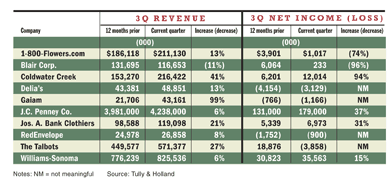Most of the publicly traded consumer merchants tracked for Multichannel Merchant by Wellesley, MA-based investment bank Tully & Holland improved their third-quarter revenue. Those increases didn’t always carry over onto the earnings side, however.
Of the 10 consumer merchants tracked, all but one — Warren, PA-based apparel and home decor cataloger Blair Corp. — posted year-over-year increases. But four of the companies suffered bottom-line erosion. In fact, only six of the 10 companies ended the quarter in the black.
And as Stuart Rose, managing director for Tully & Holland, notes, “While increased sales are good, keeping more money [after expenses and taxes] is better.”
Bottom line wilts at 1-800-Flowers.com
Quarter ended: July 2 The facts: Carle Place, NY-based 1-800-Flowers.com increased its fiscal fourth-quarter sales 13%, to a record — albeit somewhat disappointing — $211.1 million. Profits, meanwhile, plummeted 74%. Net income was just over $1 million, compared with last year’s $3.9 million. The gifts, toys, and home decor merchant reported online sales of $124.4 million, an increase of nearly 15%. Telephonic sales increased slightly during the quarter, to $60.7 million. In addition to the flagship brand, 1-800-Flowers includes the HearthSong, Plow & Hearth, Popcorn Factory, Magic Cabin Dolls, and Cheryl & Co. catalogs. The sales growth was due largely to the acquisition of $75 million Fannie May Confections Brands. But costs related to the acquisition, as well as seasonal operating losses within the division, were to blame for much of the decline in income. “During the fiscal fourth quarter we achieved several important strategic objectives that position our business for significant future growth and enhanced profitability,” 1-800-Flowers CEO Jim McCann said in a statement. “With that said, our financial results for the period were below our expectations due to several factors. Revenue growth of more than 13% percent for the quarter, while good, was below the level that we targeted with our increased marketing programs.” The skinny: The company nonetheless expects EBITDA (earnings before interest, taxes, depreciation, and amortization) to more than double next year and to grow 20%-25% in fiscal 2008 and 2009.
Hot performance for Coldwater Creek
Quarter ended: July 29 The facts: Sales for women’s apparel cataloger/retailer Coldwater Creek rose 41%, to $216.4 million from $153.3 million for the same period last year. Even more impressive was the Sandpoint, ID-based company’s income growth: 94%, to $12.0 million from $6.2 million the previous third quarter. Net sales from the retail segment, which includes both its full-price and outlet stores, climbed 52%, to $143.8 million. Direct sales rose more than 23%, to $72.6 million. The Internet accounted for most of the direct division’s increase: Web sales rose 30% to $49.9 million, while catalog sales grew a far-from-shabby 11%, to $22.7 million. Rose says Coldwater Creek continues to progress in its “mission to become one of the premier specialty retailers for women 35 years old and older.” The skinny: Coldwater Creek has more than 225 stores and plans to add another 65 this year. The company plans to open a Hong Kong office within two years as it moves away from domestic vendors. Also, it’s hoping to extend its brand in a rather unorthodox fashion: It’s testing a spa concept.
Direct sales up for Delia’s
Quarter ended: July 29 The facts: Third-quarter sales at multititle merchant Delia’s increased 13%, to $48.9 million. The New York-based company also narrowed its loss from $4.2 million a year ago to $3.1 million. Sales for the direct segment — the Delia’s and Alloy teen girls’ clothing catalogs and Websites and extreme-sports gear cataloger CCS — rose 16%, to $33.9 million from $29.2 million for the comparable quarter last year. Income from operations in the direct segment was $900,000, which is a significant turnaround from last year’s loss from operations of $1.6 million. Sales from Delia’s retail stores increased to $15.0 million from $14.2 million a year ago. The skinny: Though Delia’s did show overall top- and bottom-line improvement, comparative store sales dropped significantly — 18% — in the quarter. The company blamed the decline on lower-than-planned inventory.
